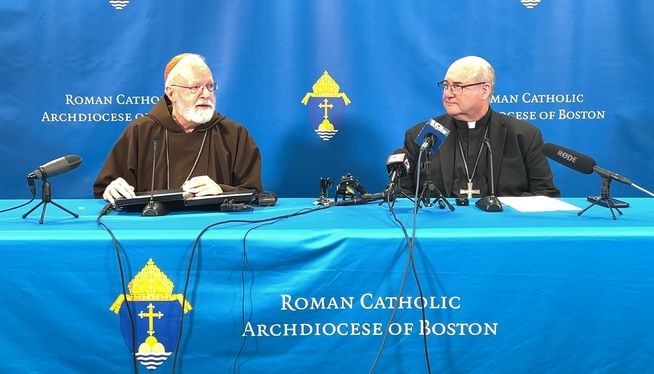
BOSTON (AP) — Pope Francis on Monday accepted the resignation of Cardinal Sean O’Malley as archbishop of Boston and named the current bishop of Providence, Rhode Island, Richard Henning, to replace him as leader of one of the most important Catholic archdioceses in the United States.
The announcement from the Vatican didn’t mention O’Malley’s other main role as Francis’ main adviser on fighting clergy sexual abuse as head of the pope’s Pontifical Commission for the Protection of Minors, suggesting he would remain in that capacity until a new commission leader is named.
St. John Paul II had tapped O’Malley to take over in Boston in 2003 at the height of the clergy sexual abuse scandal that had exploded there following an investigation by the Boston Globe newspaper. Revelations of years of abuse and coverups by the church led to the downfall of then-archbishop Cardinal Bernard Law, who resigned in disgrace in December 2002.
At age 80, O’Malley is five years beyond the normal retirement age for bishops. His 59-year-old successor, Henning, from Rockville Centre, Long Island, has been bishop of Providence since last year.
Francis has long expressed his esteem for O’Malley and selected him as a founding member of his core cardinal advisers, known as the C9.
In that role, O’Malley advised Francis not only on child protection issues, but also helped design the reform of the Vatican bureaucracy.
Born in Ohio and ordained as a priest of the Order of Friars of Minor Capuchin in 1970, O’Malley came to Massachusetts in 1992 to serve as the bishop of Fall River, a diocese that had been rocked by a sexual abuse scandal involving a priest convicted of molesting children. O’Malley was tasked with settling abuse claims.
The experience proved useful in 2003, when, after spending time as Bishop of the Diocese of Palm Beach in Florida, he was appointed by Pope John Paul II as archbishop of Boston. Once again, he took over a district shaken by sexual abuse — this time a much higher-profile crisis involving dozens of priests.
But David Clohessy, former national director of the Survivors Network of those Abused by Priests, or SNAP, criticized O’Malley for “a masterful job with his public relations but a terribly disappointing job with the church’s on-going abuse and cover up scandal.”
“He’s carefully crafted the impression of a ’reformer, while refusing to take some of the most simple and proven steps toward warning parents, parishioners and the public about potentially threatening clerics,” Clohessy said in a statement.
O’Malley’s relations with Francis haven’t always been easy. In 2018, he issued a blistering statement rebuking Francis after the pope dismissed claims of abuse by Chilean survivors of the country’s most notorious abuser.
O’Malley’s harsh tone was something of a wakeup call for Francis, who eventually apologized after commissioning an investigation into the Chilean scandal.
More recently, O’Malley’s commission flagged “serious problems” in the way the Vatican had handled the case of an ex-Jesuit artist, the Rev. Marko Rupnik, prompting Francis to order the case reopened.
Henning expressed gratitude to Pope Francis for the new appointment and described O’Malley as a faithful servant who “has served the Church of Boston for many faithful and joyful years” during his tenure.
“I am grateful to His Holiness Pope Francis for his confidence in me and for his conferral of this new mission as Archbishop of Boston. I receive this appointment relying upon divine Providence, aware that this is the Lord’s Church and that I am no more than an unworthy servant,” he said in a statement.













